- Home
- C. Robert Cargill
Dreams and Shadows Page 4
Dreams and Shadows Read online
Page 4
“This is your tree now,” the farmer implored. “You have chosen it.”
“But it is your tree, in your orchard.”
“I have many trees in this orchard. This one is now yours for as long as you want it. Please forgive my awakening you. Is there any way I could repay this offense?”
It was then that the djinn noticed just how hungry he was. “Some food would be nice, if you can spare it.” The farmer nodded to this request. “But do not salt it or you will have offended me tenfold.” The farmer left and returned an hour later with a bowl of the day’s stew. The djinn sat beside the tree and hungrily devoured his meal. He motioned for the farmer to sit beside him. “Thank you for your kindness. You have given me food when I was hungry and a tree when I possessed nothing else in the world. How can I repay your kindness?”
“All I ask is that you spare me your wrath,” pleaded the farmer.
“I have no wrath for you, young man,” said the djinn.
“Then I have all I need.”
“But what is it that you want? What is it that you wish?”
“Wish?” The farmer blushed. “There is a girl in a nearby village who I care very much for.”
“And you wish that she loved you?” the djinn asked.
“No,” said the farmer. “She already loves me. But her father has promised her to another man.”
“Then you wish she was promised to you instead?”
“Yes,” the farmer replied.
“What else would you wish for?”
“I wish she could speak so I could know what she was thinking at all times.”
“She cannot speak?”
“No. Not since birth.”
“What then would be your third wish?”
“Third wish?” he asked. “What else could a man wish for? A home, a wife, and land is all a man needs. The rest he must earn for himself, or else it has no value.”
“No value?” the djinn asked, surprised.
“No. Gold a man hasn’t earned is just something shiny on a pile that means nothing to him. We are not the sum of worthless piles. Our worth is the work that went into them.”
The djinn smiled, impressed by the wise farmer. “What is your first wish?”
“I wish the fishmonger’s daughter was promised to me.”
The djinn nodded his head, clapped his hands, and made it so. “What is your second wish?”
“I wish the fishmonger’s daughter could speak.”
The djinn nodded his head, clapped his hands twice, and made it so. “Not only is she the loveliest woman in all the land, but now she has the sweetest voice as well. What is your third wish?”
“I wish happiness upon all those you visit equal to what you are about to bring me.”
At this the djinn paused. “What?” he asked.
“You have done so much for me just now. My only wish left is that you may continue to gift others with a fate as wondrous as mine.”
At this the djinn smiled, nodded, and clapped his hands three times, making it so.
At that very moment, miles away, the vizier grew very angry, for he knew what the djinn had done and he swore the djinn would pay. Furious, he called together the rest of the viziers and the kingdom’s wisest wizards and together they pored over tablet and text looking for a final solution to the djinn problem.
That next morning the fishmonger rode up to the farmer’s home with his daughter in tow. Unsurprised, the farmer met him out in front. “It is the strangest thing,” said the fishmonger. “Last night my daughter came to me and with the voice of a dozen nightingales said, ‘Father, I love a man and I wish to marry him.’ And a voice so sweet cannot be denied, especially when she told me that she loved a man as well regarded and noble as you. So I come to you with dowry in hand asking if you would marry my daughter and make me the proudest father in all the land.”
The farmer smiled, nodded, and promised the fishmonger that he would love his daughter with all his heart. And so the two were quickly married and lived happily upon figs and fish for the remainder of their lives.
But the vizier was furious. After weeks of combing through scripture and scroll he still could not find a way to kill a djinn outright. He did however find two fragments of dark script that detailed two very important points. The first was that each djinn is only as old as memory and that they die when no one can remember their name. The second was a method of trapping them in a vessel where they could be stored and kept forever. Separate, these notions were dangerous to the djinn, but together they proved to be the path to their undoing.
At once the vizier commissioned the artisans of the kingdom to cast bottles and lamps constructed of the finest, carefully chosen materials. Then he ordered his riders to pay a visit to the fig farmer and his new bride. The riders returned by morning, bearing the freshly cut heads of the newlyweds. Commissioned then to ride in all directions, the riders sought out djinn wherever they could be found. Each rider was given a dozen bottles and lamps and was told they dared not return until each vessel was filled.
The vizier’s revenge was not swift. It was slow and deliberate. Word did not spread quickly enough and, within a year, ten thousand bottles returned filled with djinn. But not a one was the djinn he was looking for. Each bottle was stored in a vault that was then buried twenty feet beneath the sand. Robbed of both his prize and his bride, the vizier took solace in his hollow victory.
This victory was short lived, however, for the djinn were numerous—more numerous than ten thousand—and did not take the news of their imprisoned brethren without insult. While the magic of the bottles prevented the few remaining djinn from opening or even finding them, the riders who carried them were not so tight with their secrets—especially after they had run out of bottles. It took turning only a few of the riders inside out before their tongues loosened and the djinn were able to discern the villain behind these wicked oubliettes.
The vizier awoke from a night of bad dreams to find himself alone in a desolate wasteland, far from his kingdom. There he wandered for three days before the sun and sand drove him to near madness. Just before he succumbed completely, the djinn set wild dogs upon him, which tore him limb from limb to slake their own thirst with his blood. After that, his bloodline was forever cursed, with his family condemned to strangling their newborn children until not a single relation remained. Lastly, the djinn struck the vizier’s name from the record of time, some say banishing its syllables from the tongues of men altogether.
The djinn then laid waste to the entire kingdom, made barren all of the surrounding lands, and razed the sultan’s palace to dust. The selfish djinn, the cause of this swift and terrible war, joined the mass exodus and departed—morose, quiet, and heavy with shame. He was never heard from again.
CHAPTER FIVE
COLBY STEVENS’S BIG DAY
No manner of exhaustion can keep a child asleep much later than six a.m. on Christmas Day. Colby awoke at 4:35. Today he was promised anything he wanted. Anything in the world. And while it would be nice to say that Colby had pondered, even for a moment, the starving children in Africa, the plight of those ravaged by disease the world over, or even the homeless guy who slept off a twelve-pack of the cheap stuff on the corner behind the convenience store—he did not. Colby thought about toys. Lots and lots of toys.
Having assembled every catalog or advertisement left lying around his house, Colby had attacked the most expensive and extravagant toys pictured with a black Magic Marker, circling them with gleeful abandon, knowing full well that each was most likely not to make the cut. This was, after all, his chance to ask for the one perfect thing—that bright, shiny indulgence that would make him the envy of everyone around him. His mind reeled as he began to ponder gadgets of the strangest kind—toys achieving almost Seussian levels of combinations—the best of the best melded with electronic gadgets; televisions and
games systems embedded with compartments for light sabers and a fold-out pool table. His ability to fathom the ludicrous almost exceeded his desire for something truly spectacular.
He’d begun his search the afternoon before, continuing it under the cover of darkness and blankets—a San Francisco penlight his father had given him serving him well until the battery coughed and died. Then he was up again after a short rest, far before the sun, ready to attack the problem once more with the dedication of a scholar trying to solve the riddles of antiquity.
So, hours later, when his eagerness could swell no more, he dressed to meet his new best friend. He pulled on his crispest slacks and the white button-down shirt he wore every time his grandmother took him to church so they could pray for his mother and some woman named Jezebel. He combed his wet hair to one side with a nice wide part a few inches above his ear. Then the icing on the cake—his Christmas clip-on tie and the whitest socks he could find. He looked perfect. Absolutely perfect.
Thudthudthudthudthudthud. Down the stairs and around the banister, into a perfect slide toward the door. Home free.
Sylvia’s voice broke the morning’s perfection. “Just where do you think you’re going this early, young man?” her voice cracked from the other room.
“Out to play in the woods.”
“Come here and let me have a look at you,” she demanded. Colby poked his head around the wall, peering into the living room. His mother lay on the couch, almost as if she hadn’t moved a muscle from the day before. She blearily eyed him up and down. “Uh-uh. No way. Get back upstairs and change. You are not wearing your church clothes out in those woods. You’ll come back filthy. Get upstairs right this instant and don’t leave this house until I see you dressed right. You got that?”
“Okay, Mommy,” he sighed. Defeated, Colby returned up the stairs, the slow, deliberate thumping of his feet going off like firecrackers in a coffee can inside Sylvia’s head. She growled wearily, but he was too far away to hear it. Moments later he returned, this time dressed far more conservatively: jeans, a T-shirt, and his tennis shoes. Sylvia nodded her approval, reaching out with the last threads of motherly affection she could muster for the day, fussing with his clothes.
“Okay. That’s better. Whatever possessed you to dress up in your Sunday best? Some little girl got you dolled up like that?” Colby didn’t know how to answer, so he stammered a little, flanked with a pause on both sides. “Well, don’t let her break your heart, dear. Someone will always break your heart.”
“Okay, Mommy,” he said reluctantly.
“Now, you go out and be good. Where’s your watch?”
Colby smiled brightly, his arm sticking all the way out.
Sylvia nodded. “All right. Remember, back after five, but not after six.”
“Okay,” he said, smiling. Then out the door, around the corner, and off into the magical kingdom beyond the ROAD CLOSED sign. Crap, 10:53. Four hours.
The hours passed at a glacial pace, as if each second were made almost twice as long by the anticipation, and as Colby entered the final stretch toward three forty-five, his stomach tightened up, his bladder tingling—a nervous, almost sick feeling filling it—while his feet tapped uncontrollably. He spent the last seven minutes staring intently at his watch, each minute seeming longer than the one before it. As the final four changed into a five, he shot to his feet, looking around with wild, excited eyes. But there was nothing to see. No one slipping out of the bushes or from behind a tree. He waited a bit more. “Hello?” he called out. “Yashar?”
Nothing.
3:47.
“What a gyp!”
“You learn that from television too?” asked Yashar, stepping out, smiling, from behind the tree Colby had just spent an hour slumped against.
“You came!”
“But of course. And you remembered. Quite the punctual one as well. Right on time.”
Colby smiled. “Mommy says always be on time. You’re not going to break my heart, are you?”
“Pardon me?” asked Yashar.
“Well, before I left my house, Mommy said someone will always break your heart.”
“Yeah, Mom’s a keeper.”
“I love her,” said Colby proudly.
Yashar looked down at Colby with a mix of sadness and admiration. “And that’s why I chose you.”
“So, do I get my wish?” he blurted out.
“My, you get to the point quickly.” Yashar laughed. “Just a little small talk then BAM! Right to the point. I bet you’d make a good businessman.”
“My daddy’s a businessman. He sells computers. He travels a lot and isn’t around, but he’s real neat. He brings me stuff from all over the place. I’ve got snow globes and T-shirts and postcards. Would you like to see them?”
“No, thank you,” Yashar politely declined. “I’ve probably been everywhere your father has and snow globes just don’t look quite as pretty as the real thing.”
“Yeah, but did you know that it snows at the Alamo?”
“Yes, but not nearly often enough to warrant a snow globe.”
“Well, I’ve got a whole lot of cool stuff. You could come over and play sometime.”
“Why don’t we play out here?”
“What would we play out here?”
“Anything you wish,” said Yashar in a lyrical manner, as if he’d uttered the phrase a thousand times before. He even managed to gaily swoosh his arm through the air, as if conjuring happiness with it as he spoke.
“Oooh! When do I get my wish?”
“Such impatience.”
“Yeah, yeah. I know. Patience is a virtue. You adults always say that. But how do I know you’re a real genie? You don’t even have a bottle.”
“Quit it with the bottle stuff, kid. It’s insulting.”
“What?” asked Colby, confused.
Yashar collected himself after slipping out of character. “It hurts my feelings.”
“Why?”
“Let me tell you a story.” Yashar looked around and saw a fallen log, moss covered but solid enough to support their weight. He took a seat atop it and patted the spot beside him. Colby hopped up on the log next to him, listening intently.
“There once was an evil man,” he began.
“Was he a wizard?” asked Colby.
“No, he was a vizier.”
“What’s that?”
“He’s the king’s most trusted advisor. If the king has a question or a command, the vizier tells him whether it’s a good idea or not. Sometimes the vizier tells the king what he should do, but he does so in a way that makes the king think it was his own idea.”
“So they’re bad men?”
“Some of them, but most were wise and benevolent. This one, however, was bad, an evil, wicked man. He was jealous because of something I did. You see, there was this man, and he was a good man; he worked hard and did everything to the best of his ability. All he desired was for the most beautiful woman in the kingdom to be his wife. Now this wasn’t all bad because she actually loved him too—very much so—but this vizier, he wanted her as well and not for so noble a cause as love.”
“What did he want her for?”
Yashar paused for a moment. “So that people could look at him and say, ‘He must be a great man to have such a beautiful wife.’ ”
“Oh. I thought he wanted her for sex,” said Colby, disappointed.
Yashar glared at Colby. “Where did you learn of such things?”
“A kid in my class named Ruben. Once, when we were in his basement, he showed me some of his daddy’s magazines and they had women with no clothes on and Ruben said that it was so you could have sex with them. But I didn’t like the pictures, I swear!”
“Do you want to hear my story or not?” asked Yashar.
Colby nodded excitedly, his head bobbing like
a woodpecker against an invisible tree.
“All right then. I made it so this beautiful woman would marry the good man instead of the evil vizier. That made the vizier very angry and he commanded many wizards—”
“Cool! I knew there would be wizards in here somewhere! Wizards are always in the good stories.”
“Well, this isn’t a very good story.”
“Then why are you telling it?”
“Because it has a point.”
“Like a fable?”
“Exactly,” said Yashar. “Except that this one is true. And very sad.”
“Oh. What happened?”
“Well, the vizier was so angry at what I’d done, he commanded his wizards to weave a spell that would trap us djinn in bottles.”
“Like on TV?”
“Worse! In the stories, the djinn could stay in the bottle for ten thousand years and be okay as long as someone eventually found and opened the bottle. But the truth is, if everybody forgets about us, we fade away.”
“But everyone knows about genies.”
“Yes, but not each individual genie. If everyone forgets about me, Yashar, or all the people who remember me die, then I die too. My essence fades away into the sunset.”
“So a lot of genies died?”
“Almost all of them. They used to say that there were as many djinn as there were grains of sand. Now they number less than the trees in this field.”
“And it’s all your fault?”
Yashar grimaced at Colby, not that it was an unfair question. “Yes.”
“Well, I won’t forget you. Promise.”
“That’s what I’m counting on, Colby. That’s what I’m counting on. You are very much the kind of child I was looking for.”
“What kind is that?” asked Colby.

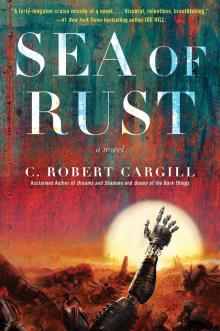 Sea of Rust
Sea of Rust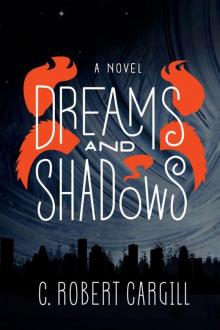 Dreams and Shadows: A Novel
Dreams and Shadows: A Novel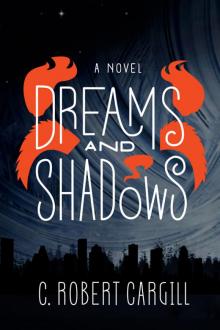 Dreams and Shadows
Dreams and Shadows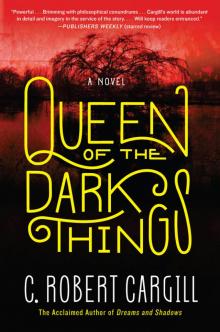 Queen of the Dark Things
Queen of the Dark Things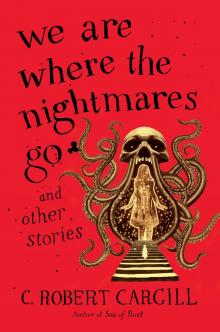 We Are Where the Nightmares Go and Other Stories
We Are Where the Nightmares Go and Other Stories